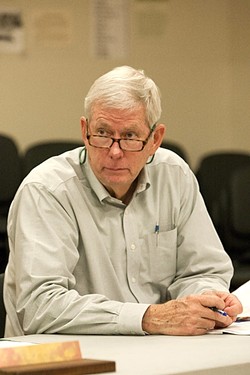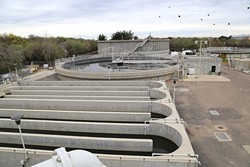A crowd large enough to look out of place at a local government meeting packed the Arroyo Grande City Hall on Feb. 3. They were South San Luis Obispo County Sanitation District ratepayers, and many of them weren’t happy. Some even brought signs with them.
“Investigation not presentation,” one read in large, red handwritten letters.

- FILE PHOTO BY STEVE E. MILLER
- UNDER SCRUTINY : Former South SLO County Sanitation District administrator John Wallace disputes allegations of conflict of interest and possible malfeasance leveled against him in the final years of his tenure.
John Wallace stood at a podium, his back to them. Wallace, the sanitation district’s former administrator, came to defend himself in the wake of a recently released audit of the final 10 years of his 27-year tenure. Among other allegations, the audit accuses him of mismanagement, conflict of interest, and most seriously, possible criminal malfeasance.
“I’m here to tell you tonight that those allegations are untrue,” he told the district’s three-member board of directors. He brought his own documents, his own statistics and graphs, and a digital slide show presentation. He planned to use them to make his case to board.
They gave him 10 minutes.
After he finished, it was the public’s turn. Some came to support him, characterizing Wallace as a respected businessman who cares for his community. Others weren’t convinced.
“It’s very possible that somebody is nice but is doing something that is not legal,” Julie London, a district ratepayer, told the board.
The allegations. The arguments. The acrimony. It’s the latest scene in a drama that’s played out for years. The audit report (conducted at the behest of the board by an experienced auditor)—which could have been the final word on the questions, concerns, and allegations that swirled around Wallace in the final years of his time at the district—simply added more fuel to the fire. His detractors tout it as proof of their claims that Wallace used his position at the district to rake in cash for his engineering firm, and they’re pushing for criminal investigations at the local, state, and federal level. Wallace continues to fight back, questioning the report and the auditor who compiled it, and raising the possibility that politics, not policy, are behind the charges leveled against him.
“Public oversight is a welcome and necessary part of any public position,” Wallace wrote in an email response to questions from New Times. “Character assassination is not.”
The road to audit
The South SLO County Sanitation District was founded in 1963. Today, it provides wastewater treatment and disposal services to an estimated 40,000 residents in Arroyo Grande, Grover Beach, and Oceano, with the district’s large wastewater treatment plant residing in Oceano. The district is run by an administrator, who serves at the pleasure of a three-member board of directors made up of representatives from each of the three municipalities.
Wallace’s tenure with the district began in 1986, just two years after he founded his engineering firm, the Wallace Group, then known as John L. Wallace and Associates. The contract he signed at the time was just three pages long, and it states that the district is engaging both Wallace and his company. That short document essentially laid the foundation for the concerns and conflict of interest accusations against Wallace that surfaced more than 25 years later. According to the 2015 audit report, that original contract lacked provisions for addressing performance and accountability issues, and aside from changes to rates charged by Wallace, wasn’t amended until 2011.
“One board member likened the Tri-County area as ‘rural,’ not as sophisticated as big city operations, and that many business transactions in the area were done on a handshake,” the audit report released in January 2016 stated.
According to the report, Wallace performed “without incident” in the 18 years between 1986 and 2004. During those years, he and his company also began to grow, and would eventually add municipalities like Avila Beach, Nipomo, Oceano, Pismo Beach, Atascadero, and others to its list of clients.
But in 2011, state water officials slapped the district with a $1.1 million fine for a 2010 raw sewage spill. Around the same time, others began to raise questions about Wallace’s management of the district, as well as his dual roles as both administrator and CEO of his company, which was receiving thousands of dollars for services rendered to the district. The possible conflict of interest was also the subject of an investigation by the SLO County Auditor Controller’s Office and a SLO County grand jury report the same year.
“[Wallace] has a conflict of interest in his dual, simultaneous roles as administrator of the district’s facilities and operations, and as the majority owner of a company, Wallace Group, that supplies a major share of contracted services to the district without benefit of competitive bidding for such services,” the grand jury report stated.
In the wake of the grand jury’s report, which argued that the original contract essentially gave Wallace the discretion to assign the performance of any or all services under the contract to his own company, the district amended the original contract for the first time in 25 years. According to previous New Times reports, the amended contract was separated into two contracts—one for him and one for the Wallace Group.
But concerns and calls for further action continued, with some ratepayers and elected officials calling for an audit of the district’s finances and Wallace’s practices. Their demands were finally addressed when the current incarnation of the district’s board voted to hire the firm of former IRS auditor Carl Knudson to conduct a review of Wallace’s management practices and the district’s financials between 2004 and 2013, when Wallace retired from his role as administrator.
Dollars and cents
The audit, referred to colloquially as “The Knudson Audit,” was an expensive undertaking, costing the district $91,700. After an estimated 600 hours of work, including interviews with more than 33 people—current and past district employees, board members, and Wallace himself—Knudson’s firm produced the 124-page report.
The report, like those by the grand jury and county auditor, raised serious questions about the final years of Wallace’s tenure. Among them was a sharp increase in the amount of money that his company was billing the district for various services. According to Knudson, the Wallace Group received more than $6 million for administrative fees, engineering fees, and major budget item projections between 1999 and 2010. The report also noted that the district’s revenue declined from 2005 to 2012, while expenses rose significantly from 2003 to 2011.
“Our past management practices review revealed that Wallace assumed control over all aspects of the financial affairs of the district,” the report reads. “Including the approval of the Wallace Group invoices that were presented to the district for payment.”

- PHOTO BY DYLAN HONEA-BAUMANN
- THE COMPANY: According to a recent audit, the Wallace Group received more than $6 million between 1999 and 2010 for services to the South County Sanitation District while its CEO, John Wallace, also worked as the district’s administrator.
Wallace disputed the allegation in his email to New Times, calling Knudson’s choice of words biased.
“I was hired by the board and assigned the responsibility of administering and managing the district, as well as providing engineering services,” he wrote. “This was not an uncommon arrangement with small districts, and it was precisely what the board wanted to do to most efficiently manage the obligations the district faced.”
Wallace disputes most, if not all, of the accusations contained within Knudson’s report. In both his email and an in-person interview with New Times, Wallace characterized the overall report as unfair, arguing that Knudson didn’t attempt find out the causes and context behind the report’s findings. For example, Wallace claimed that the report lacked insight when it came to the district’s rising expenditures in light of the cost of various construction projects that totaled around $5 million.
“The major flaw with this report is it’s attaching blame without providing any substantive analysis of the multiple issues facing the district over the years which necessitated that actions be taken, and therefore it fails to address why past decisions were made,” Wallace wrote.
He also disputed one of the audit’s most troubling allegations: that he possibly engaged in criminal malfeasance while working as the district’s administrator. The accusations included claims that Wallace denied dumping permits for two groups, a private company and the California State Parks and Recreation Department, because they declined to use the Wallace Group for engineering and design services.
Wallace denied the allegations, stating that they were “absolutely untrue” and a “gross error” in the report. In fact, Wallace said that during his four-hour interview with Knudson, the district’s contracted auditor never brought up the malfeasance allegations, denying him the chance to explain or rebut them.
“I think it was an obvious oversight on his part,” Wallace said in a recent interview with New Times. “To not do your due diligence is a gross oversight.”
In a written response to the district board about the matter, Knudson said that it was against “well established” policy to confront government vendors with accusations of criminal activity. Knudson argued that not bringing up the allegations functioned as a protective for Wallace.
“If I had confronted Mr. Wallace with the allegations, and he said what he said in the open forum last week,” Knudson wrote, “it could have then been used against him by the law enforcement authorities, and any admission or confession could have then been devastating to Mr. Wallace.”
The board’s role
Whether you believe Wallace or the findings of Knudson’s audit and investigation, there’s little doubt that what took place during the longtime administrator’s tenure occurred under the watch and often with the approval of members of the various incarnations of the district’s board of directors.
When questioned about his dual roles and the increases in billings and payment to his company, Wallace noted that such matters were reviewed and approved by the board.
“Ultimately, the board reviewed and approved the work to be done and every invoice presented,” Wallace wrote in his email response to questions from New Times.
While Knudson’s report focused mainly on Wallace, it also contained some mentions of the district’s board of directors. Knudson interviewed several current and former board members during the audit. Bill Nicolls, who served on the board from 2008 to 2012, defended the payments to Wallace’s company and Wallace as an administrator. Nicolls said that he reviewed billing invoices from the Wallace Group prior to their approval.
“Every warrant that I looked at and approved was discussed at a previous board meeting,” Nicolls said in an interview with New Times. “[Wallace] had the authority to do that.”
Knudson’s report argued that reviewing billings for services rendered by the Wallace Group wasn’t enough to mitigate a potential conflict of interest, noting that Nicolls said that he didn’t ask Wallace to provide proof that the services his company was billing were actually done.
“The fact that some former board members have stated they reviewed the Wallace Group billings with Wallace is commendable,” the report stated, “but puts the board member in the untenable position of vouching for each and every billing submitted to the district by the Wallace Group.”
Tony Ferrara, who served on the board from 2000 to 2014 while he was mayor of Arroyo Grande, echoed Nicolls’ sentiments in his interview with Knudson. According to the report, Ferrara said he was satisfied that the work billed to the district by the Wallace Group was completed and approved by the board.
“[Ferrara] stated that if anyone wanted to blame how much the Wallace Group made at the district, they could blame it on the board of directors,” the report states.
Other board members who served during Wallace’s tenure were not as confident as Nicholls and Ferrara. One of those is Debbie Peterson, former Grover Beach mayor who served on the sanitation district’s board in 2013. According to the report, Peterson raised concerns about Wallace, the billings to his company, and the amount of money the district was spending even before she served on the board.
“Once she was on the board, her concerns about the Wallace billings and how much district money had been paid to the Wallace Group over the years concerned her even more,” the report said.
On the board, Peterson continued to push for an audit, a review of the district’s finances, and analysis of billing and payments to the Wallace Group, as well as legal billing related to personnel issues and the 2010 sewage spill. Speaking to New Times, Peterson said it was still difficult to get the board to take action until the red flags were too obvious to ignore.
“Really the board had no choice but to deal with the facts in front of them,” said Peterson, who’s now campaigning for election to the SLO County Board of Supervisors’ 3rd District seat. “It took many years for the board to take responsibility and move forward with the audit.”
Even after Peterson left the board, she continued to push the district, calling for the results of the Knudson report to be made available to the public and advocating for the board to follow Knudson’s recommendation to send the report to law enforcement officials.
Like Peterson, current sanitation district board director and Arroyo Grande Mayor Jim Hill is a vocal proponent of scrutinizing Wallace, his actions as administrator, and his company’s dealings with the district. Hill said he was “not surprised” by the findings in Knudson’s report. In an interview shortly after the report was made public, Hill told New Times that previous approvals by the board make it highly unlikely that the district could recover any money it paid to the Wallace Group.
“I suspect that restitution would be difficult,” he said.
For his part, Wallace stated he disagreed with the Knudson report’s characterization of the board as dysfunctional, though he did think the board suffers from “unhelpful influence by critics with a political agenda.”
“When the work is examined in a fair and objective way, there is no justification to blame or criticize either me or the board for past decisions,” Wallace wrote in his email response to New Times’ questions.
Looking forward
The future is far from certain, and what people think it will hold differs depending on whom you ask. For the district’s part, current board members insist that the mistakes of the past, particularly those that came to light in the wake of Knudson’s audit and report, have been corrected. Matthew Guerrero, who represents the unincorporated city of Oceano on the district’s board of directors, said the board made a number of changes to improve its management.

- PHOTO BY DYLAN HONEA-BAUMANN
- DIRTY OR CLEAN: The South SLO County Sanitation District provides wastewater services for residents in Arroyo Grande, Grover Beach, and Oceano.
“I think you can see that operationally and financially, it has made a 180-degree turnaround,” Guerrero said. “In 2013 we started looking forward. We created multiyear budget plans and maintenance programs … . Things started happening that were very encouraging.”
For Wallace, the road ahead may be more fraught. In his email to New Times, Wallace discussed the impact the report and the controversy surrounding it has had on him personally.
“You cannot have your name on the front page of the newspaper with one-sided articles without it affecting you,” he wrote.
However, he also noted that he has received “support” from his friends, clients, colleagues, and other people in the community.
“They continue to give me and the company great support,” he wrote.
After the public meeting where Wallace argued his case against the report, the district’s board agreed to forward it on to the SLO County District Attorney, the California Office of the Attorney General, and the FBI.
Lee Cunningham, SLO County’s assistant district attorney, said that the office had received a copy of the report and were requesting “more information” about the matter. The California Attorney General’s Office declined to confirm whether they received the report. The FBI also declined to comment on the matter.
What action, if any, these entities take appears to be the next chapter in the lengthy back-and-forth between Wallace and the district. Shortly after Wallace spoke to the board, his attorney, Dennis Law, told the board that the possibility of law enforcement’s involvement was harmful to Wallace and his business, but did not specifically mention any plans for litigation. Wallace also did not mention any plans to sue the district or the board.
“We are focused, motivated, and will continue to provide the superior work we always have,” he wrote. “And, in the meantime, with the assistance of my advisors, I am considering my options.”
Staff Writer Chris McGuinness can be reached at [email protected], or on Twitter at @CWMcGuinness.
Comments